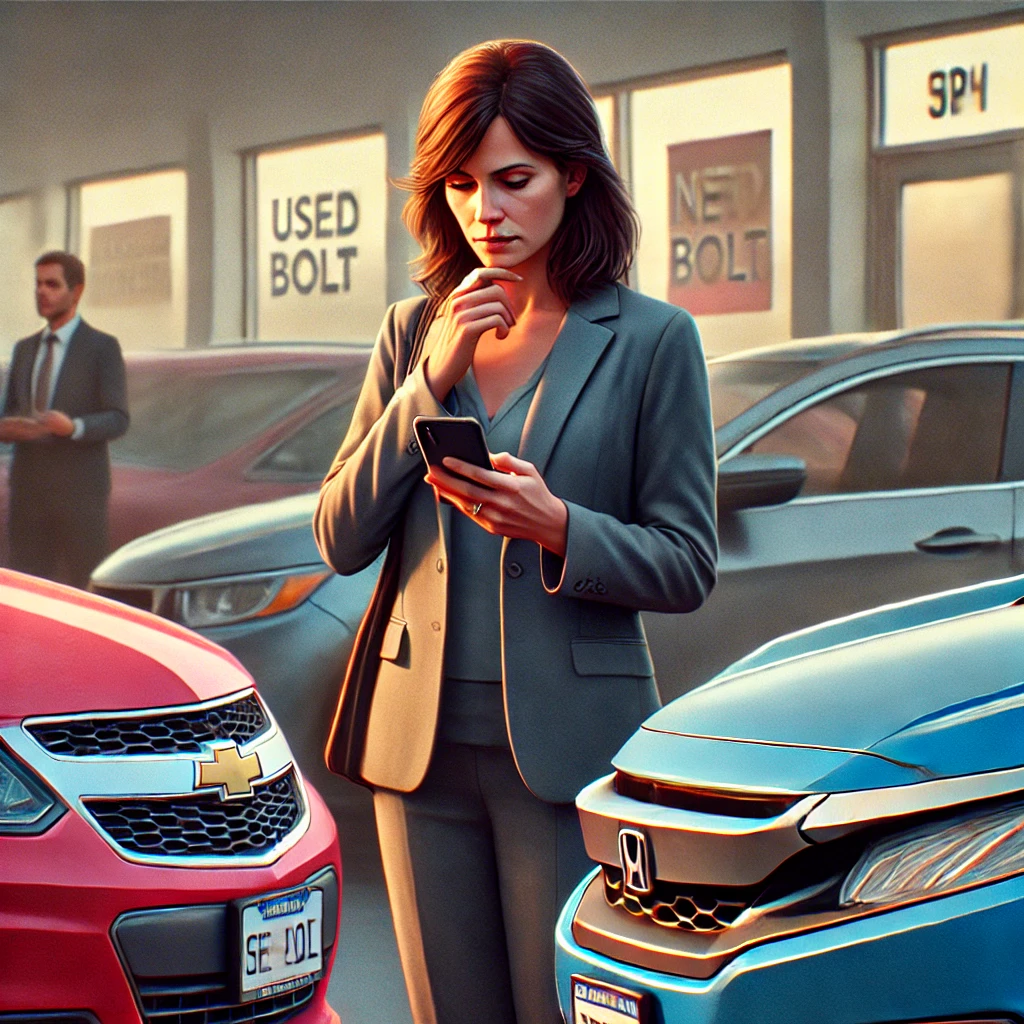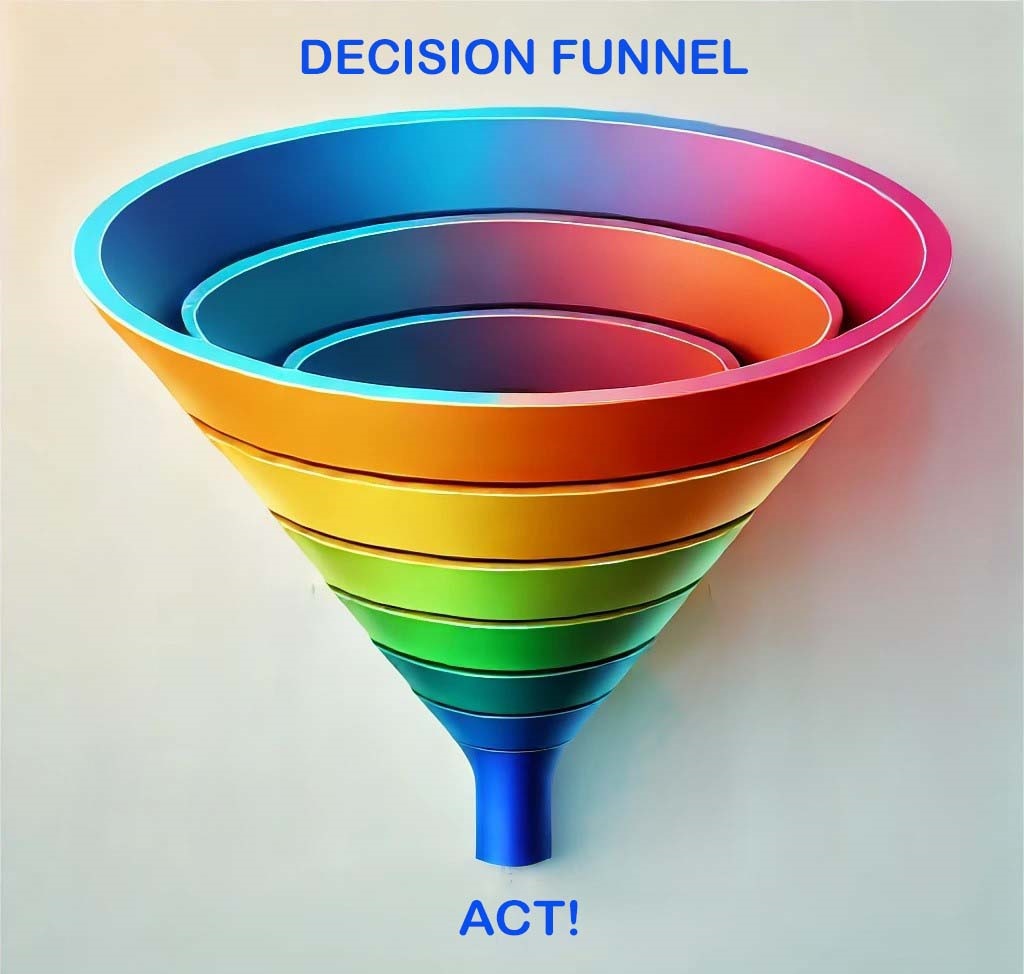Vital Success Skill:
How to Make Great Decisions
Your success depends on your decisions. You need to easily and quickly decide what to do for anything and everything. And your decisions must be RIGHT.
Every successful person has mastered this skill. For example, brilliant scientists, successful surgeons, financial geniuses, founders of huge companies, builders of breakthrough tech and awesome group leaders all make fast, correct decisions.
Without the skills to make great decisions, you fail. You build stress, waste time and look like a coward. Because of fear, you either freeze or your decisions are WRONG. For example, you never get rich until your money choices are CORRECT.
Benefits of Mastering Your Decision-Making Skill
1. You stop wasting time and energy. Instead, you get more done in less time.
2. You have more fun, less stress; more pleasure, less pain; more order, less confusion.
3. You make and deserve more money.
4. You earn a reputation as a courageous person who can lead others.
5. Best of all, when you make good decisions, you build your self-confidence.
“SELF-CONFIDENCE is nothing more than belief in one’s ability to decide and in one’s decisions.” — L. Ron Hubbard
So what is the best way to make decisions? Let’s dive in.
Seven Steps for Perfect Decisions
Making a decision is like using a funnel. You pour all your of information into the top to reach a decision, and then you act!
1. Pick a decision you need to make.
For example, what career should you pick? Who should you marry? Which skills do you want to master?
Group decisions are also important. What is the best direction for your group? How should you invest your time or money for the group? Which opportunities should you jump on?
2. Next, use your imagination.
Even though you do not yet know what your choice will be, look into the future and see yourself making the right choice. How will you feel after you decide on your best path?
Imagine having the five benefits above to enjoy a confidence boost.
3. To make your decision you need two things: a purpose and information.
“Given* information and the purpose, anybody can make a decision.” — L. Ron Hubbard (*Definition of “Given” = obtained or assumed.)
In other words, as long as you have the information you need, and you have a purpose in mind, you will make a great decision.
Let’s start with your purpose.
4. Pick your purpose.
What are your reasons behind this decision. What do you want to accomplish?
For example, you want to decide if you want to be a computer programmer or a school teacher. In both cases, you want to make money and do good things. This is your purpose.
If you are not sure about your purpose, do the next step then come back and your purpose should be obvious.
5. Gather Information
What do you need to know to make your best choice? Below are fifteen questions to answer. As you gather information about your options, one will stand out as the best. You’ll know it when you see it.
- Which choice makes you happiest? What will give you the most pride, joy and satisfaction? What excites you?
- What facts about your options are available from an AI chatbot? These amazing artificial intelligence apps can give you more specific answers to any question than has ever been available to anyone in history. They are all free. Check out Open AI’s ChatGPT, Microsoft’s Copilot, Google’s Gemini or Meta’s AI Llama.
- What are the statistics for each choice? Which choice is most successful right now? Which one has been getting the best results lately?
- What about the exchange? Time, energy and money? What will each choice cost you? What will each choice give back to you?
- What are the sequences? What happens after you make your decision? What will you then do?
- What short- and long-term results can you expect?
- Which of your choices are the most ethical? What choice will you be most proud of?
- What is the probability of success for each option? What has done best recently?
- Check your resources. Do you have the time, money, people and energy you will need for each choice?
- What are the end results? If everything went smoothly, how would each choice turn out? What would the results be? How would it change things in a year or two?
- What do others want you to do and why? As your choice probably affects other people, you want to know what choice they want you to make. More importantly, why they want you to make it.
- What are the potential gains and benefits? If everything went well with each choice, what would happen?
- What are the potential losses and liabilities? What could go wrong with each choice? How might you protect yourself?
- What are all the barriers and difficulties for each choice? What might get in your way for each?
- What are the freedoms and possibilities for each choice? What extraordinary results might you create?
6. Review your purpose and your information.
The correct choice will be obvious to you. If not, review your purpose and gather more information until you see what you should do.
7. Act!
Move forward with your decision. Take the first step, even if it is a baby step.
The worst thing you can do is to do nothing. Do not sit on your hands. Get up and go for it!
Example #1: Pat's Car Decisions

Pat pulled out her phone, opened this article and followed the steps to help her make the decision.
Imagination: Pat closed her eyes and imagined driving away from the car lot in the best car for her. She sees herself smiling for joy! She feels a boost and is excited to make a decision.
Purpose: Buy an affordable car, with as little maintenance time or cost, for driving to work and around town.
Information:
1. Neither car makes her happier than the other. She likes both colors.
2. Her AI chatbot gives her a ton of information about reliability, maintenance costs, safety and more.
3. Statistically, the Bolt is the better car. It will cost her less to buy and lower maintenance costs over the next few years. The battery may or may not need to be replaced within five years.
4. Financially, they are about the same price to purchase and she has enough savings to buy either one.
5. Considering the long-term success, she likes how the Bolt is better for the environment and lower maintenance costs. She is not worried about the battery.
Pat reviews her purpose and the information. The Chevy Bolt fits her purpose best.
She walks up to the salesman, with total confidence, and says, “If you lower the Bolt’s price by $1000 I’ll buy it right now.” He smiles and says, “Wow! You’re a lot more decisive than most people. OK, let me ask.”
One minute later he comes back and says, “You’ve got a deal!”
An hour later, Pat drives away from the dealership, smiling for joy.
Example #2: Maria's Marriage Decision
Maria could not decide if she should accept George’s proposal to get married.
George had been her boyfriend for three years. She was surprised when he proposed to her the previous night. While she loved him, she had doubts and uncertainties. She needed confidence in this decision as it would be one of the most important she would ever make.
Maria used her imagination (Step #2) and enjoyed the relief she will feel once she makes a great decision. She relaxed and smiled.
Next, she picked her purpose: Be happily married and create a wonderful family with at least two kids.
She reviewed the 15 questions and wrote down 10 pieces of information.
1. George is kind, dependable, and makes me laugh.
2. He has a demanding job that takes up much of his time.
3. He makes a lot of money and enjoys sharing it with me.
4. I want to live in my home town near my parents, but he wants to stay 100 miles away from there.
5. We always have fun together.
6. We both want a couple of kids.
7. My parents think I should marry him, especially my mom.
8. The worst thing that could happen is we argue all the time, but we usually agree on everything, except where we live.
9. The best thing that might happen is we enjoy our lives together and stay in love.
10. I worry I will make another bad relationship like I had with Jimmy five years ago. He broke my heart and I’ll never forgive him.
Maria realizes her regret with Jimmy needs to be handled. She takes a few days to take responsibility for her time with him. She stops blaming Jimmy and herself.
She looks at her purpose and information again. NOW she feels positive about this opportunity with George. She is excited!
Maria and George talk for an entire day. She asks him more questions. She tells him about her purpose and thoughts.
She tells him about Jimmy and how she stopped blaming him by accepting full responsibility.
They talk about where they will live and agree to stay in George’s house, but visit Maria’s home town at least once each month.
They discuss goals for their marriage and find they love each other more than ever before.
Maria accepts George’s proposal.
Example #3: Robert Needs a Better Source of Income
Robert is swamped by his bills and hates his job.
As a telephone tech support representative, he is constantly attacked by unhappy customers. Their computers are old and worthless, but they pay for support help anyway. His boss tells him to pretend to listen to their issues or “accidentally” hang up on them. The pay is horrible and Robert sees no future here.
He needs a new source of income that is more enjoyable. He goes through the steps in this article to decide on a new path for himself.
#1 Decision: Robert can either:
1. Try to get rid of his boss and steal his job.
2. Find a job he likes.
3. Get a better education.
#2 Imagination: Robert imagines having a path to wealth and the confidence to make it go right.
#4 Purpose: Find an enjoyable way to make five times as much money within two years.
#5 Information: Robert writes down his dozens of answers to the questions. For example:
1. Ethics: He immediately eliminates the first option as he does not want to live his life as a criminal by ruining his boss and lying to people. This leaves two choices.
2. Happiness: Finding a better job and getting a better education will make him happy.
3. Google’s Gemini AI Chatbot gives him several good ideas of how to find a better job. He looks at job openings and finds a dozen he might like. He asks Gemini about getting a better education, but the answers are silly.
4. Statistics: He sees high-tech jobs are paying the most, especially if you know how to add AI to existing companies computer systems.
5. Exchange: He is excited to see several online training courses for AI. The cost is only $29 per month.
While answering several the questions a lightbulb goes off in Robert’s head. He has a plan that fits his purpose.
Plan: He will keep his job for two more weeks while spending 10 hours per day learning how to use AI.
Act: The training is easier than he expected. He applies for three jobs and gets one interview. They offer him a job that pays twice as much as his rotten job. Best of all, he likes the company and his future potential there.
He accepts!
Tip #1: Decision Freeze
If you cannot make up your mind, take a break. Decide to not decide, for now.
Focus on present time. Hold the room corners and stop thinking about it.
If you stop thinking and keep all of your attention in present time, the right decision will come to you.
Learn more by going to the Present-Time Focus article category.
Tip #2: Courage
If you are afraid of what might happen in the future, you cannot make great decisions.
As you master this important skill, you will reduce your fear and boost your courage.
Learn more by reading “Inaction and Indecision.”
Tip #3: Regret
If you have made bad choices in the past, you may be afraid to make decisions in the present. Your self-confidence is low.
In this case, forgive yourself. You made the best choice you could, at the time.
If you take responsibility for your past decisions and they will no longer hurt you. Learn more.
From now on, use your purpose and gather plenty of information before you make your decisions.
Tip #4: Anxiety
If you find yourself thinking about future events too much, the stress can kill you.
“What will I do if this horrible thing happens?”
“What if she says ‘no’?”
“What if he breaks his agreement?”
What if? What if? What if?
To resolve this, decide you will make your future decisions then. Not now, but at that time.
Because you know how to make great decisions, you can stop worrying about your future decisions. You can relax because your future will take care of itself.




